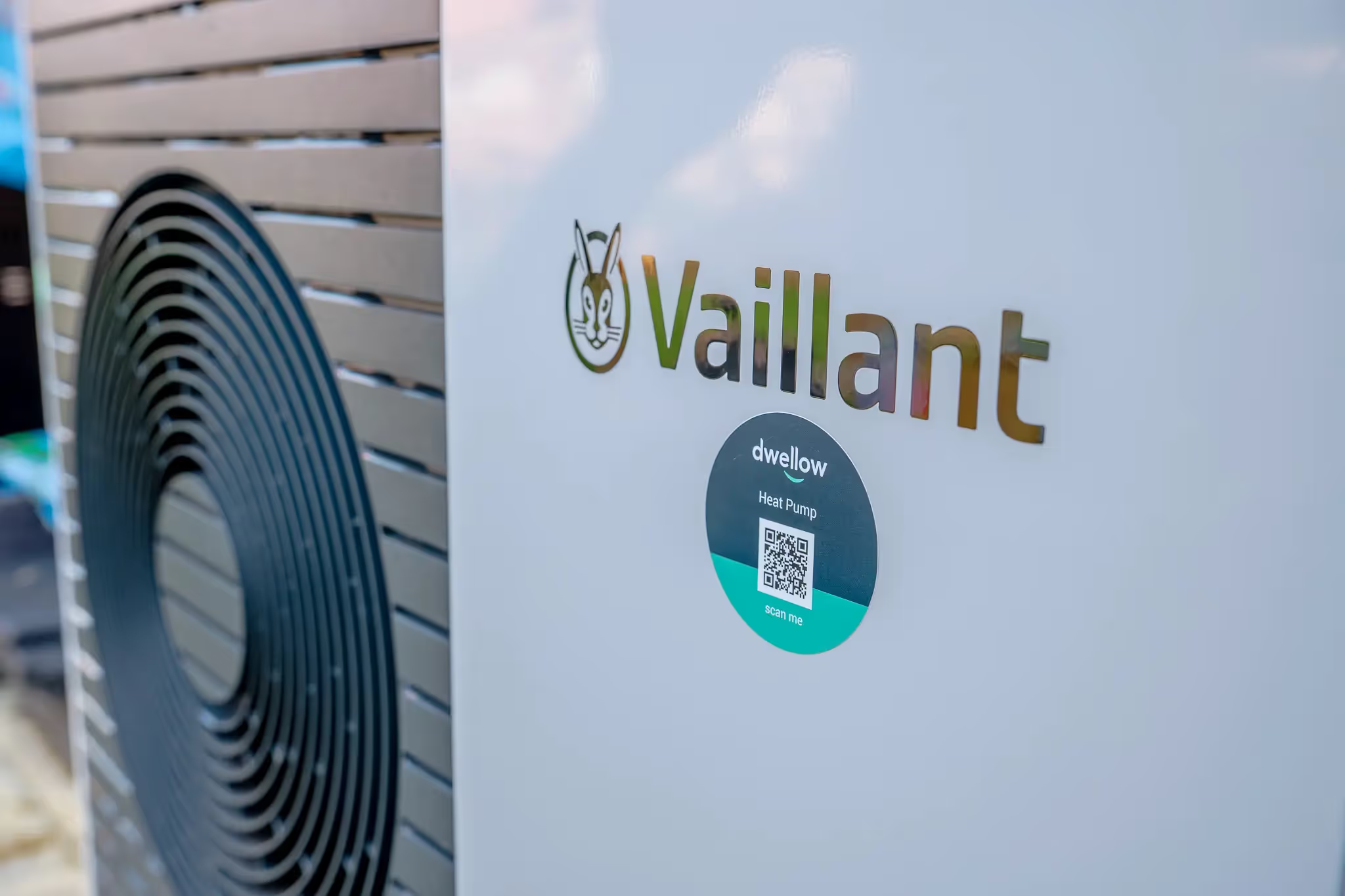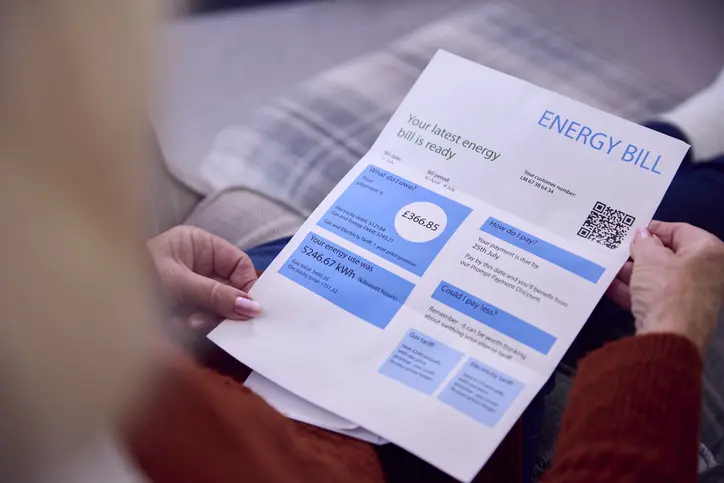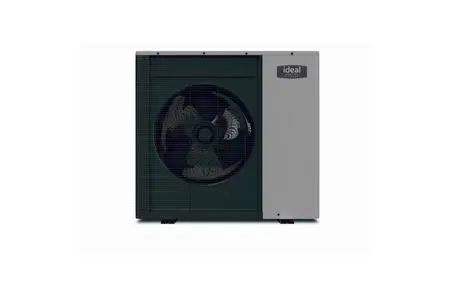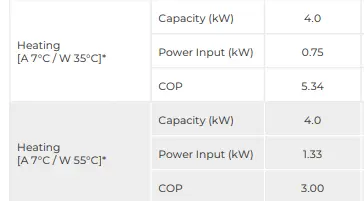
Heat pumps consume a reasonable amount of electricity.
Below, we’ll explain why even small 4kW units use 8kWh-15kWh per day and up to 450kWh per month. Whilst this is a lot, an efficient home utilising a heat pump will cost a similar amount to run as a gas boiler when designed to a 50 degree flow temperature (based on the price cap for both gas and electricity in June 2025).
Better still, we’ll explain why using solar panels alongside heat pumps is a great way to save money.
And finally, we’ll go over the steps to ensure your heat pump is as efficient as possible including:
Got questions? You can speak to our heat pump experts here.
Or, use our heat pump tool here to get a fixed price on-screen within 2 minutes.

Expect a typical heat pump to use 8kWh-15kWh per day when averaged across the year - this figure is derived using a well-insulated, small-to-medium-sized home (e.g., a two-bedroom semi-detached) with a heat pump with a 5kW-6kW heating output, operating in mild to cold UK weather, where the outside temperature ranges from 0°C to -4°C.
However, the exact electricity consumption of your air source heat pump will depend on a few variables including:
On the basis of 8kWh-15kWh daily energy usage, expect your air source heat pump to consume 240-450kWh of electricity per month. This is averaged across the months of the year, but in reality the winter will be a much higher figure and the summer will be lower.
The biggest factor contributing to how much electricity your heat pump uses month by month is the weather. The lower the outdoor temperature, the harder your heat pump is going to have to work to maintain a consistent temperature in your property, leading to a lot more energy usage.

The exact running cost for a heat pump is directly related to the cost of electricity, as well as how much electricity your heat pump consumes at peak output.
Assuming a 25p electricity price cap, you’d expect a heat pump to cost:
These figures are fairly loose, given variables mentioned above (insulation, radiator size, heating and hot water demand etc) play a huge role in how much your heat pump consumes in electricity and therefore, the overall running costs.
The above figures would apply for a heat pump in the 5-6kW range, powering a small property such as a 2-bedroom semi-detached house. If you’re using a larger heat pump in a larger property, expect costs to be much higher.
As we’ve detailed in our full guide to heat pump running costs here, some heat pumps can cost in excess of £2,000 per year to run, but so can some boilers. It all depends on the heat loss of the home and how much heating energy is required to keep the home at a comfortable temperature.
In a modern and reasonably well insulated home, expect your air source heat pump to be comparable in running costs to a gas boiler.
A-rated gas boilers are typically 94% efficient. However, the most efficient heat pumps, such as the Ideal Logic Air, can work at over 400% efficiency when the installation design is done well.
Unfortunately, what you save due to efficiency you lose thanks to the fact that electricity (which heat pumps consume) is nearing 5 times the price of gas.
Overall, this means gas boilers are similar in cost to run as air source heat pumps.
Yes, you can use an air source heat pump with solar panels.
In fact, if you're making an investment in a heat pump, it’s advisable to install solar panels at the same time. By using a heat pump your electricity demand will spike dramatically and solar panels will be able to generate the majority of the additional electricity needed.
Overall, that’s going to mean huge savings when it comes to your electricity bill every month.
We’ve written a full guide to using heat pumps with solar panels here.
Heat pumps don’t produce heat like a gas boiler does.
Even in cool temperatures, the fan blades can draw in air and extract heat. This air is then compressed to increase its temperature and the heat is transferred to a refrigerant and then on to the water in the system. The whole process is much more efficient than how gas boilers operate.
Put simply, a heat pump such as the Ideal Logic Air may be able to generate approximately 4kWh of heat for every 1kWh of electricity that it consumes.
To determine the efficiency of a heat pump, you'll need to look at the spec sheet for that particular unit.
Generally, they'll be a number next to its SCOP or COP rating, such as 4. A COP/SCOP of 4 would indicate 400% efficiency, whereas 3 would indicate 300% efficiency; the higher the number the more efficient a heat pump is. The SCOP of a heat pump is only achievable if the design of the system is correct and the house is suited to higher efficiencies.
So, we’ve determined heat pumps use a reasonable amount of electricity, but can be inline with gas boilers in terms of overall running costs.
Here are some things you can do to improve the overall efficiency of your heat pump and reduce the amount of power that it consumes.
The higher the flow temperature, the more electricity your heat pump is going to consume.
This is evident when we take a look at the data sheet for the Ideal Logic Air.

As you can see, this is the spec sheet for the Ideal Logic Air 4kW model. At 35°C flow temperature you’d get a COP of 5.34 (534% efficient). However, if you bump the flow temperature up to 55°C you’ll see the COP drop to 3 (300%).
Air source heat pumps work most efficiently when they are constantly on, at a low flow temperature. By planning ahead and keeping your property at a consistent temperature you’ll be able to use a lower flow temperature and energy consumption will drop dramatically.
Regular maintenance of your heat pump unit ensures it can get as close to the manufacturer’s COP figures as possible.
During an annual service, your heat pump engineer will:
A regularly maintained system is going to work much more efficiently than one that’s not well maintained, not to mention, not getting an annual service may void your warranty.
If your heat pump is consuming more power than expected, one of the best upgrades you can do is to fit larger radiators.
As we mentioned with flow temperatures, heat pumps work most efficiently “low and slow”. By having radiators with a larger surface area, you’ll achieve the same internal room temperature, but be using a much lower flow temperature on your heat pump.
Radiators tend to come in 3 types: single, P+ and double. You can either choose to fit larger radiators (for instance a 600mm x 1000mm instead of a 600mm x 600mm), or simply a larger type. For example, you could upgrade the largest radiators into your house from singles to doubles.
Your heat pump engineer will be able to determine the most crucial radiators in your house and suggest a specific size and type of radiator to upgrade to.
Being able to drop your flow rate from 55°C to 35°C could see the efficiency of your heat pump jump from 300% to over 500%, so radiator upgrades are a worthy investment.
If you’re in a new-build or a property that’s less than 10-years old, your insulation will be up to standard. Whilst newer insulation may help your system work more efficiently, it’s unlikely to give a good return on investment.
However, if you live in an older property with poor insulation, an upgrade is likely to improve your heat pump’s efficiency dramatically and reduce overall energy consumption.
Get quotes on your new air source heat pump using our clickable tool here.
Or, if you have any questions, speak to our heat pump experts here.
Try our free quote tool. You'll have your personalised quote in under a minute.